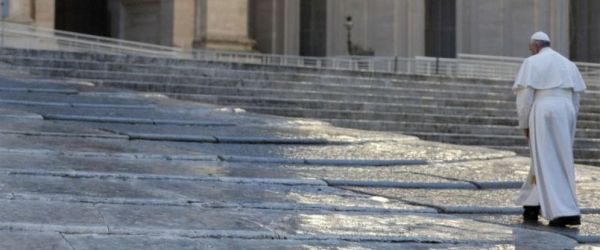In today’s Gospel Jesus insists on the conditions for being his disciples: preferring nothing to the love of Christ, carrying one’s cross and following him. Many people in fact drew near to Jesus, they wanted to be included among his followers; and this would happen especially after some miraculous sign which accredited him as the Messiah, the King of Israel. However Jesus did not want to disappoint anyone. He knew well what awaited him in Jerusalem and which path the Father was asking him to take: it was the Way of the Cross, the way of sacrificing himself for the forgiveness of our sins. Following Jesus does not mean taking part in a triumphal procession! It means sharing his merciful love, entering his great work of mercy for each and every man and for all men. The work of Jesus is, precisely, a work of mercy, a work of forgiveness and of love! Jesus is so full of mercy! And this universal pardon, this mercy, passes through the Cross. Jesus, however, does not want to do this work alone: he wants to involve us too in the mission that the Father entrusted to him. After the Resurrection he was to say to his disciples: “As the Father has sent me, even so I send you”... if you forgive the sins of any, they are forgiven” (Jn 20:21-22). Jesus’ disciple renounces all his possessions because in Jesus he has found the greatest Good in which every other good receives its full value and meaning: family ties, other relationships, work, cultural and economic goods and so forth.... The Christian detaches him or herself from all things and rediscovers all things in the logic of the Gospel, the logic of love and of service.
To explain this requirement, Jesus uses two parables: that of the tower to be built and that of the king going to war. The latter says: “What king, going to encounter another king in war, will not sit down first and take counsel whether he is able with ten thousand to meet him who comes against him with twenty thousand? And if not, while the other is yet a great way off, he sends an embassy and asks terms of peace” (Lk 14:31-32). Jesus does not wish to address the topic of war here; it is only a parable. Yet at this moment in which we are praying intensely for peace, this word of the Lord touches us to the core, and essentially tells us: there is a more profound war that we must all fight! It is the firm and courageous decision to renounce evil and its enticements and to choose the good, ready to pay in person: this is following Christ, this is what taking up our cross means! This profound war against evil! What is the use of waging war, so many wars, if you aren't capable of waging this profound war against evil? It is pointless! It doesn’t work.... Among other things this war against evil entails saying “no” to the fratricidal hatred and falsehood that are used; saying “no” to violence in all its forms; saying “no” to the proliferation of weapons and to the illegal arms trade. There is so much of it! So much of it! And the doubt always remains: is this war or that war — because wars are everywhere — really a war to solve problems or is it a commercial war for selling weapons in illegal trade? These are the enemies to fight, united and consistent, following no other interests than those of peace and of the common good.
[Pope Francis, Angelus, 8 September 2013]












